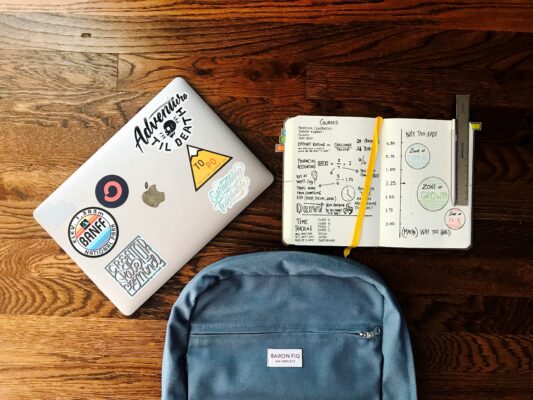College | Daily Life | Disability | IBD | Work

It all started in October 2022, when I learned the biologic I was on (Remicade) wouldn’t work for me anymore. I was in shock, mostly because I had been on it for six years and it always worked wonders for me. I was told it would stop working for me eventually, but why did this have to happen in my second-to-last semester of college? My doctor suggested I switch to Humira, which is a biologic similar to Remicade. Okay, I thought. I’ll switch to Humira and everything would be fine. Boy was I wrong.
I didn’t get to start Humira until December of 2022 due to different delays in care. At this point, I was getting sicker by the minute, making finishing the semester harder. Not having been on any medication for a couple months really wrecked havoc on my body. Humira ended up not working, and I was switched to Stelara in April, 2023. It would’ve been sooner, but yet another delay in care happened. At this point, I was extremely sick, and I was in my final semester of college. Not only was I taking classes, but I was student teaching as well. Unfortunately, Stelara did not work either. l was put on Skyrizi in August of 2023. Yet somehow, even with all of these medications failing me and getting sicker with each month, I was able to persevere and graduate from college (with a 4.0 GPA, might I add).
I often wonder how I was able to actually do that. I look back and think of all the times I was stuck in the bathroom at the elementary school either throwing up or having diarrhea. I remember needing to text my mentor teacher and apologize, promising to try to hurry so I could get back to teach my lesson. Or, I was up the night before throwing up for hours with my parents telling me they didn’t see how I would make it into the school the next day. But with each day, I still got up and went. I was determined to graduate. In this blog, I’d like to offer some tips and advice I have about navigating a flare during a semester.

During the switch between Humira and Stelara I had a colonoscopy. I was immediately hospitalized from the results. Panic set in as I wondered what would happen with my semester of student teaching. The requirement was to get 100 days in, and I had just started merely two weeks before the colonoscopy. If you missed a day, you had to make it up. My colonoscopy was in the middle of the week, which meant I already missed 3 days for it due to prep and it being almost three hours away. For the hospitalization, I went in February 3rd and didn’t return to student teaching until February 13th. This didn’t help with the stress because I knew I’d have to make up these days at the end of the semester so that I could fulfill the requirement to graduate.

Photo of backpack, laptop, and planner by Matt Ragland on Unsplash
One of the first things I did when learning I’d have to be hospitalized was contact everyone at the elementary school and my university. I called my mentor teacher, emailed the administrators at the elementary school, and got in contact with my professors, advisors, and the field experience coordinator at my university. So, my first piece of advice would be to stay in contact with everyone and keep them up-to-date. I would email them from the hospital with any updates I had. I worked with them to ensure I could continue my student teaching. The elementary school staff was wonderful and very helpful. My professors at the university helped me out a lot. Keeping in touch and building that support network at your university is vital. This will help you get the adequate support you need. Contact your school’s support services or the disability office for additional support as well. I had a field placement accommodation plan in place that really helped me get through the semester.
My second piece of advice would be to not push yourself. I definitely pushed too hard, and I was hospitalized again a week after I graduated. Was it worth it? Yes, because I wanted to graduate so badly. There were days I went in to student teach that I should have taken off. I did not want to have days to make up after graduation. Luckily, I didn’t have to, but at what cost? Take the breaks when you need them. Ask for extensions when you need it. Take moments to yourself to reflect on how you’re feeling and what you might need.
Another piece of advice is to advocate for yourself. My mentor teacher wanted me to teach way more than I did, but I told her I was too sick. She wanted me to teach a lot of full days, but I literally wasn’t capable. I did have to teach ten full days per the university’s requirement, but those were hard. I stood a lot and didn’t get to rest. It was hard to run to the bathroom during those times. I drank less water and rested less in the evenings because I had to plan lessons for the next day. I knew I couldn’t keep doing that, so I basically had to tell my mentor teacher no. It felt embarrassing and I knew she didn’t like it. But she couldn’t understand what it was like to be living in this diseased body that was so run down. She tried her best to be empathetic, though.
The last piece of advice, even though it sounds so cliché, is not to give up. I was so intent on graduating that I never had the mindset of giving up. Some times were harder than others to see the finish line, but with each day that I went meant another day crossed off of that long 100 day internship.
It is possible to get through a semester during a flare. It is so hard, but you can do it. Some days will seem never-ending and other days you’ll be extremely overwhelmed. But with the right attitude, mindset, and support system, you can make it through. If you can’t make it through, know that you can work with disability services to take a medical leave and return when you are able.
Note from the Editor:
For more tips and blogs about managing IBD and/or ostomy during college including tips from our community and information from a disability services professional on reasonable accommodations visit our College Life Stage page.

